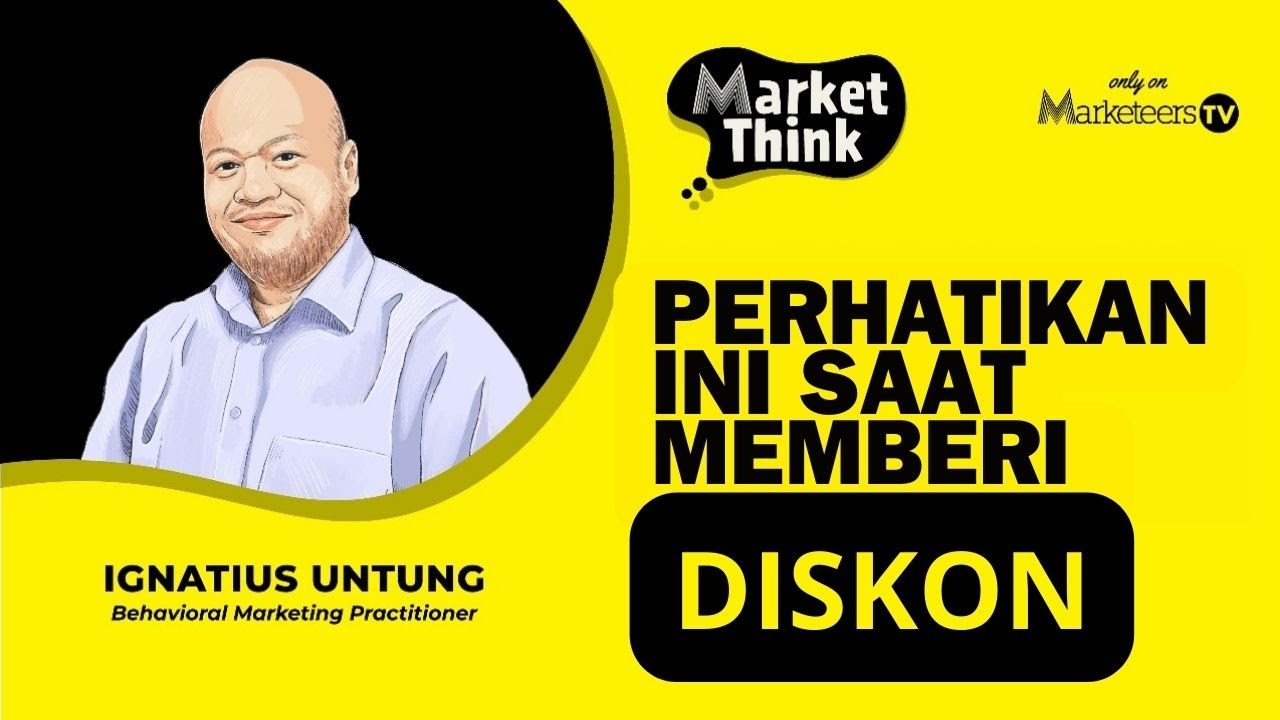MARKET THINK #7. PROMO BONUS VS DISCOUNT
Summary
TLDRIn this video, Ignatius Untung explores how businesses use bonuses, rather than discounts, to enhance customer experience and drive sales. He explains the psychological principles behind these strategies, such as the 'Peak and Effect' and mental accounting, which help create positive memories and justify purchases. By offering gifts like iPhones or luxury items, brands can maintain a high brand perception without devaluing their products. Untung emphasizes the importance of understanding consumer psychology and targeting the right audience, highlighting how effective promotions can improve customer satisfaction and boost brand loyalty.
Takeaways
- 😀 Bonuses in promotions help create positive emotional associations with brands, making customers feel better about their purchase decision.
- 😀 Offering bonuses, like free iPhones or watches, instead of discounts helps maintain the perceived value of a product and avoids devaluing the brand.
- 😀 The 'Peak and Effect' principle suggests that the most memorable parts of an experience are the highest point and the final impression, which can be enhanced by bonuses.
- 😀 Bonuses reduce the 'pain' of paying by shifting focus away from the price and onto the bonus, improving the overall customer experience.
- 😀 People often make purchases driven by euphoria, and the logic of the decision may only kick in after the purchase when the 'euphoria' wears off.
- 😀 Offering bonuses can prevent post-purchase regret by providing customers with something extra to feel good about, maintaining a sense of satisfaction.
- 😀 Bonuses can be used to anchor brand perception, associating the brand with positive experiences and premium products.
- 😀 Mental accounting plays a role in how consumers perceive value, as bonuses can be seen as a reward or an emotional justification for buying products they might not otherwise purchase.
- 😀 Discounting the price can damage the brand's perception, while offering a bonus maintains the brand's value and the perceived worth of the product.
- 😀 Understanding the target market's sensitivity to price is essential; people who are not price-sensitive are more likely to appreciate the bonus rather than negotiate for a discount.
Q & A
Why do marketers use bonuses instead of discounts in promotional offers?
-Marketers use bonuses because they create a sense of pleasure for consumers, while avoiding the 'pain' of a price reduction. Bonuses help enhance the overall value perception without devaluing the brand, as a discount might.
What is the 'Peak and Effect' principle in marketing?
-The 'Peak and Effect' principle refers to the way people remember experiences based on their highest (peak) point and the final moments. In promotions, receiving a bonus after a purchase creates a positive memory, increasing customer satisfaction and brand loyalty.
How does offering a bonus affect brand perception?
-Offering a bonus can strengthen positive brand perception by associating the brand with luxury, prestige, and customer satisfaction. It helps maintain emotional connections with consumers, leaving them with a favorable view of the brand even after the purchase.
What role does 'mental accounting' play in consumer purchasing decisions?
-Mental accounting refers to how consumers divide their spending into different 'buckets' or budgets for specific needs. This allows consumers to rationalize purchases, especially when they receive a bonus, making them feel less guilty about spending money on an item they might have otherwise deemed too expensive.
Why might consumers prefer a bonus over a direct price discount?
-Consumers may prefer a bonus because it allows them to perceive the purchase as a better deal without lowering the price. This feeling of receiving something extra without reducing the value of the product is more emotionally satisfying than a simple discount.
How do bonuses help mitigate post-purchase regret?
-Bonuses can reduce post-purchase regret by giving consumers something to feel happy about after their purchase. Even if their euphoria from the initial purchase fades, the bonus, such as a free product, maintains positive emotions, reinforcing the decision.
What is the risk of offering too large a discount on a product?
-Offering too large a discount can devalue the product in the eyes of the consumer. If the price is significantly reduced, consumers may start questioning the product’s true value, which could harm the brand’s perception and diminish future sales.
How does the type of bonus impact consumer decisions?
-The type of bonus can influence consumer decisions significantly. Bonuses that align with the product's value and meet consumer needs are more likely to be perceived positively. For example, giving a high-quality item as a bonus can enhance the overall purchase experience.
Why is it important for bonuses to be relevant to the consumer's needs?
-Relevance is key because bonuses that align with the consumer’s needs or desires enhance their perceived value of the promotion. Irrelevant bonuses, such as unrelated items, can confuse or frustrate consumers, undermining the effectiveness of the promotion.
How do marketers ensure the bonus is perceived as valuable?
-Marketers ensure the bonus is perceived as valuable by offering high-quality, desirable products that complement the main purchase. Additionally, the bonus must align with the brand's image and not feel out of place, as a significant gap between the product and bonus can create confusion.
Outlines

This section is available to paid users only. Please upgrade to access this part.
Upgrade NowMindmap

This section is available to paid users only. Please upgrade to access this part.
Upgrade NowKeywords

This section is available to paid users only. Please upgrade to access this part.
Upgrade NowHighlights

This section is available to paid users only. Please upgrade to access this part.
Upgrade NowTranscripts

This section is available to paid users only. Please upgrade to access this part.
Upgrade NowBrowse More Related Video

Kasih Diskon Boleh Asal Jangan Lewatkan Ini - Market Think 103

What is Customer Relationship Management (CRM)?| From A Business Professor

Typical Sales Promotions & How Firms Use Them to Get You to Buy

GENIUS Strategy To Make Everyone Want to Buy Your Stuff

MARKET THINK #2. KENAPA SEMUA BAIKNYA BELAJAR BRAND?

Top 5 BEST CRM For Small Business (2024) | Best Picks Reviewed!
5.0 / 5 (0 votes)